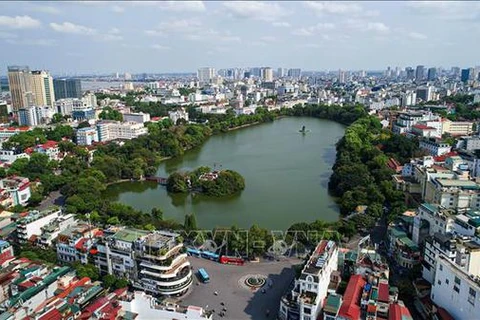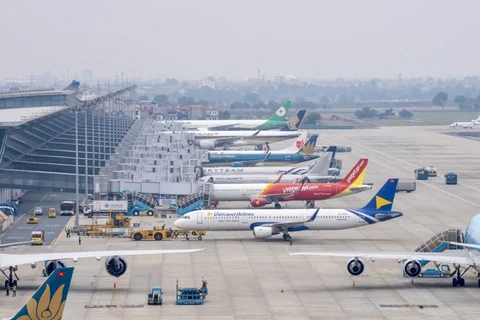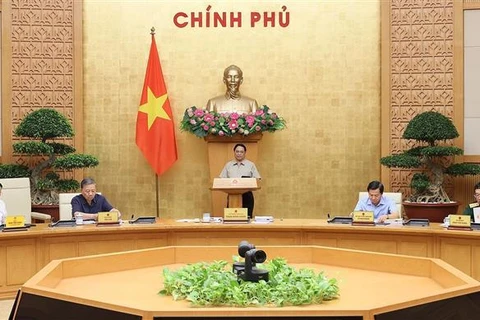 In the 2016-2020 period, Hanoi contributed over 16% to the GDP and 18% to the State budget averagely (Photo: VNA)
In the 2016-2020 period, Hanoi contributed over 16% to the GDP and 18% to the State budget averagely (Photo: VNA) Hanoi (VNA) – After 10 years of implementation, the Capital Law has shown several shortcomings, requiring the building of a revised version which stipulates special policies and mechanisms to optimise Hanoi’s resources. The focus is on attracting high-quality human resources, according to Vice Director of the Municipal Department of Justice Nguyen Cong Anh.
Anh granted an interview to VietnamPlus on the building of the Capital Law (revised).
Reporter: Looking on the reality of the Capital Law implementation, how do you evaluate the positive impact that the law has brought to Hanoi city in recent years?
Mr. Nguyen Cong Anh: After 10 years of implementation, the Capital Law, which was adopted by the National Assembly on November 21, 2012, and took effect from July 1, 2013, has brought about positive effects on the capital city’s socioeconomic development.
The law has helped the city establish a comprehensive set of legal tools serving the building and management of the city planning, contributing to making the city more orderly and civilised. City authorities have more power in regulating penalties for violations of construction and land order regulations has been enhanced.
The development of civilised culture in Hanoi and the building and maintenance of society have been strengthened. This ensures the diversity of cultural and spiritual life for citizens, and the protection and upgrading of cultural-historical heritage. At the same time, education and training development has been promoted, supporting the city’s leading position in human resources quality as well as the scale and networks of schools and quality of education services.
The support policies on society and the welfare of the State have been implemented in a proper, full, and timely manner. Hanoi has issued policies related to social welfare, while ensuring political stability, security, defense, and social order.
The highlight of the process is the increasing growth through years, contributing to the country’s overall growth. The gross regional domestic product (GRDP) value of the city in 2020 reached 1.02 quadrillion VND (41.8 billion USD), while its per capita GRDP hit 5,325 USD, nearly double the country’s average.
In the 2016-2020 period, on the average, Hanoi contributed over 16% to the country’s GDP, 18.5% to the State budget, 20% to the domestic income, and 8.6% to the country’s total import-export revenue. It has increasingly deserved its role as a major hub of the economy and international transition as well as a driving force for the growth of the Red River Delta.
Reporter: The Capital Law has been implemented for more than 10 years since July 2013. Along with effectiveness, according to you, what shortcomings and limitations that the revised version of the law should deal with?
Mr. Nguyen Cong Anh: In my opinion, many regulations in the Capital Law 2012 are more like general provisions, making them difficult to apply. After the Capital Law 2012 took effect, many other laws were also issued, causing overlaps with the Land Law, Housing Law, and Residence Law, which also include regulations like the Capital Law.
Land reserve relocation and post-relocation management have not been strictly implemented for some agencies and organisations according to Decision No. 130/QD-TTg issued on January 23, 2015, by the Prime Minister. The application of standards and regulations in planning for several public works in the inner-city area has yet to be harmonious in all fields. This includes traffic, construction, water supply and drainage, electricity, television, and internet.
Meanwhile, the environmental standards such as those for wastewater, emissions, and noise in the capital have been issued but with ineffective implementation. Policies on cultural development have been built but have yet to utilised. Evidently, theaters and museums have not been exploited their full potential and have not attracted a large number of visitors and tourists.
At the same time, there is still some content that the 2012 Capital Law has not mentioned such as the specific organisational structure of the capital administration, as well as agricultural and rural development policies. There is still a lack of a common operating mechanism in the coordination among provinces and centrally-run cities in the Capital Region. The Hanoi Capital Region Coordination Council has been established but has yet to operate effectively.
Regarding traffic development, the current rate of land reserve allocated for traffic is still too low compared to real requirements. Meanwhile, expanding traffic roads in the inner city area is very difficult, while the cost of compensation and ground clearance for road expansion is very high, putting pressure on the city’s budget.
Reporter: So in your opinion, how should this revision of Capital Law institutionalise policies to create special and outstanding mechanisms for the capital city’s development?
Mr. Nguyen Cong Anh: In order to effectively realise targets and orientations for Hanoi’s development following Resolution No. 15-NQ/TW issued on May 5, 2022, by the Politburo on city development, as well as Resolution No. 30-NQ/TW issued by the Politburo on November 23, 2022, on socio-economic development, I think that one important thing is to underline the decentralisation and delegation of power in the revised version of the Capital Law.
Accordingly, the draft Capital Law (revised) should optimise special mechanisms and policies that can be applied immediately.
 Connecting transportation routes to create momentum for the growth of the city’s economic development (Photo: VietnamPlus)
Connecting transportation routes to create momentum for the growth of the city’s economic development (Photo: VietnamPlus) Issues that require legislative authorization should be delegated to competent entities according to current law, ensuring feasibility and uniformity. Along with strong decentralization, there should be corresponding regulations on Hanoi’s responsibilities as well as the mechanism for inspection and supervision of the implementation of powers and duties of city authorities at all levels.
It is necessary to provide the city with policies to make full use of its resources, while focusing on attracting high-quality human resources. In addition, it should consider the priorities in applying regulations of the Capital Law (revised) if the bill is approved.
Reporter: Thank you very much./.























